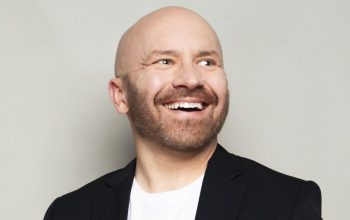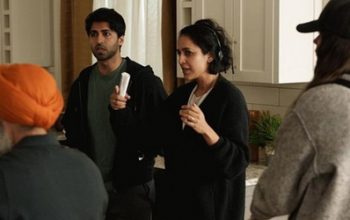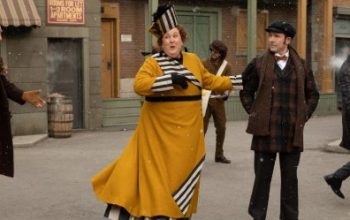Caught premieres tonight on CBC, and I had the chance to chat with star/executive producer Allan Hawco, and stars Enuka Okuma, Paul Gross, Tori Anderson, and Eric Johnson about the 70s crime drama.
Here is what they shared about their characters on Caught, adapting the story from Lisa Moore’s novel, and the appeal of a show set in the 1970s.
For a sneak peek of the first episode and promos, check out Heather’s preview.
Why did you want to tackle this project and this era?
Allan: Lisa Moore’s book. The minute I read it, I fell in love with it and I saw a map about how I wanted to see it. I paired up with John Krizanc, who coincidentally is often Paul’s writing partner. John and I broke it and we clearly we saw Paul [as Roy Patterson]. It kind of like was all constant spread out in front of us and I’m in love with from the first minute.
What’s appealing to each of you about the limited series format, something that has been increasing in popularity?
Enuka: I think it’s economical storytelling. You trim the fat away and you’re left with the essentials. I feel like that was done perfectly. I don’t think it would make sense to me any longer than. Although it started off with another episode, it started off with six.
Allan: It got better with five.
Paul: It’s kind of a question of the story. This is not something that’s open-ended. There’s a finality to it, and this particular narrative has an endpoint. If you look at the great stuff like Homeland, they all have a drive toward the end of the season that makes it feel like a long movie. I think that’s partly why [limited series] are starting to gain more and more popularity is that gradually the audience is tired of episodic stuff. Structurally in that kind of show, you end up repeating yourself.
Eric: It’s a different kind of storytelling, too. With this, you’re doing long-form drama. It’s essentially the same kind of stories that you would tell in an independent feature or feature film, but you get to go further in depth with the characters. Instead of spending two and a half hours with the characters, you’re spending five hours, or maybe 10 hours depending on [the series]. It just allows you to get deeper into the story. You cut narrow and deep. That becomes a very satisfying thing for an audience because you become further invested in the characters. For me as a performer, it’s just, it’s such a rich playground to play in.
Can you talk a bit about filming Caught in multiple locations?
Allan: It was a challenge. There are certain touchstones in this adaptation that had to be anchored in the book. In the book, Hearn’s living in Vancouver, but for me, it was more exotic to put them in Mexico, further away from the law and his past.
The book is not based on a true story, but our adaptation is combined with the book and this living guy, Garth Sexton, who works in our transport department. He’s lived a version of Slaney’s life, so we brought him on as a historic consultant. I started cannibalizing his real story and mixing it in between the book and the real story. Things that Slaney goes through actually happened to Garth. He had a Patterson in his life who was chasing him. He was in Colombia in life or death situations, and taken down with his partner. The book is inspired by this real famous event that happened in Newfoundland in the 70s.
Enuka, I love how with your character, we see that some things have changed in the workplace and some things have stayed exactly the same. The men are asking her to get them coffee, but meanwhile, she’s the one who may lead them to something really tangible.
Enuka: I thought that it was a brilliant idea on Allan’s part and the writers to create this character because she’s not in Lisa Morris’ book. My mom actually worked for the RCMP. She was a secretary, and she saw a lot of guys on their way out — the top guys who were almost retiring — and so she was basically running the place. She experienced a lot of sexism and racism. I know that it was very, very real, but all the stories we’re hearing today, all the women that I know who’ve experienced it, it’s as relevant now as it was then. It was a really great role for me. I have to say I loved every minute of it.
Tori, we don’t learn too much about Ada initially, but I started getting an inkling that she’s hiding something, and maybe that she can’t be trusted.
Tori: Everyone has a past, but there’s not a lot of information about her. I think she’s opportunistic. She’s trying to figure out where her place is. She’s described as a grifter in a sense. The fun in that character is that she’s different to every single person she meets.
Enuka: You don’t know what she’s going to do next.
Tori: But you don’t know what any of the characters are going to do next. Their motives aren’t clear from an audience standpoint. In the book, she’s an idea of this Bohemian woman who doesn’t really care that much. She’s very different in the series.
How did you decide which characters from the book that you had to include? And at what point did you decide that you wanted to add new characters?
Allan: When you start mapping out what the plot is, the core elements you want to take from the book become evident pretty quickly. The main characters from the book all live [in the series]. You face problems when you take an adaptation from a novel where you’re able to be inside a character’s thoughts as a reader versus as a viewer where you’re just watching someone and think. It’s very difficult to portray on television. In the case of Patterson, he is by himself a lot in the book on this journey. He’s separate from other cops in his unit, so we created a character in KC. Someone who also had something they wanted to prove, something they wanted to achieve for themselves, and how could they team up together so that a Patterson had someone to go on this journey with.
KC was also inspired for a whole other set of reasons that weren’t just to do with Patterson. Everyone is going for some sort of redemption. It’s almost like their last chance, and that’s a theme that played out except for maybe Ada because she’s at it from a different angle. The story takes on a life its own. What stays and what goes gets complicated as you’re breaking the story. The story starts to tell you what needs to stay in.
There’s been an increase in TV shows and films being set in the 70s, especially crime stories. It was a time when there wasn’t video and smartphones everywhere, and forensics weren’t as advanced. Is it appealing to explore a crime story in an era where you’re not constrained by modern-day technology?
Allan: It was so much more fun.
Paul: There’s a weird innocence to it, too. Yes, people are getting killed, and maybe it’s the nostalgia of looking back at [that time], but there’s an innocent quality to it.
Eric: Everything is human. There’s no looking something up, or sending a text message. Either you’re an eyewitness, so it’s personal, or you’re interviewing a witness, so it’s personal. It becomes a little more loaded because it’s not faceless anymore. It’s not just data. It’s people. People lie, they’re deceptive and emotional. It heightens everything.
Enuka: The action is there because you have to go on foot to find the thing you’re looking for, or the person you’re after. It’s physical and we can film that.
Eric: You’re not the NSA wearing a headset going, “Oh yeah, we’ve got a guy we know exactly where he is,” or “Just intercept that boat there.”
Allan: I don’t want to write another scene where you triangulate a cell phone.
Image Courtesy of CBC



One thought on “A Conversation with the Cast and Executive Producer of Caught”